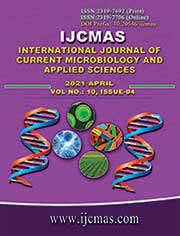


 National Academy of Agricultural Sciences (NAAS)
National Academy of Agricultural Sciences (NAAS)

|
PRINT ISSN : 2319-7692
Online ISSN : 2319-7706 Issues : 12 per year Publisher : Excellent Publishers Email : editorijcmas@gmail.com / submit@ijcmas.com Editor-in-chief: Dr.M.Prakash Index Copernicus ICV 2018: 95.39 NAAS RATING 2020: 5.38 |
Tomato (Solanum lycopersicum) is widely cultivated vegetable crop and processed throughout the world which is highly susceptible to moisture stress. In this study Methylobacterium spp. viz., M. aminovorans and M. thiocyanatum were used to increase the moisture stress tolerance. Artificial moisture stress was induced to tomato seeds using Polyethylene Glycol (PEG) with concentration ranged from 0 to -3bars.The results showed that highest growth parameters were exhibited in tomato seedlings treated with M.thiocyanatum, where it exhibited maximum germination percentage at 0 bar (42.7%), vigor index at 0 bar (170.8), shoot length at -3bar (2.7 cm),root and seedling length at -2 bar (4.1cm, 5.1cm) followed by M.aminovorans, which showed germination percentage of 40% at (-1.5 bar), vigor index of 131.2 at (-1 bar), root, shoot and seedling length of 2.9cm, 1.9cm, 4.8cm at (-3 bar) respectively. Compared to treated seeds, the un-inoculated control showed lowest germination percentage at 0 bar (17.2%), vigor index (48.3), root, shoot and seedling length (1.7cm, 1.1cm, 2.2cm). Root hair deformation was observed in both treated seedlings which are grown under aseptic condition. In which, M. aminovorans performed well when compared to M. thiocyanatum. The activity of antioxidant enzymes catalase (CAT), peroxidase (PER), proline, glycine betaine (GB) and superoxide dismutase (SOD) were enhanced by M. aminovorans at -1.5 bars & M. thiocyanatum at -2 bars which have the ability to protect the plant under moisture stress conditions. Thus, Methylobacterium has the ability to mitigate drought stress and increase the drought tolerance of tomato crop.
 |
 |
 |
 |
 |